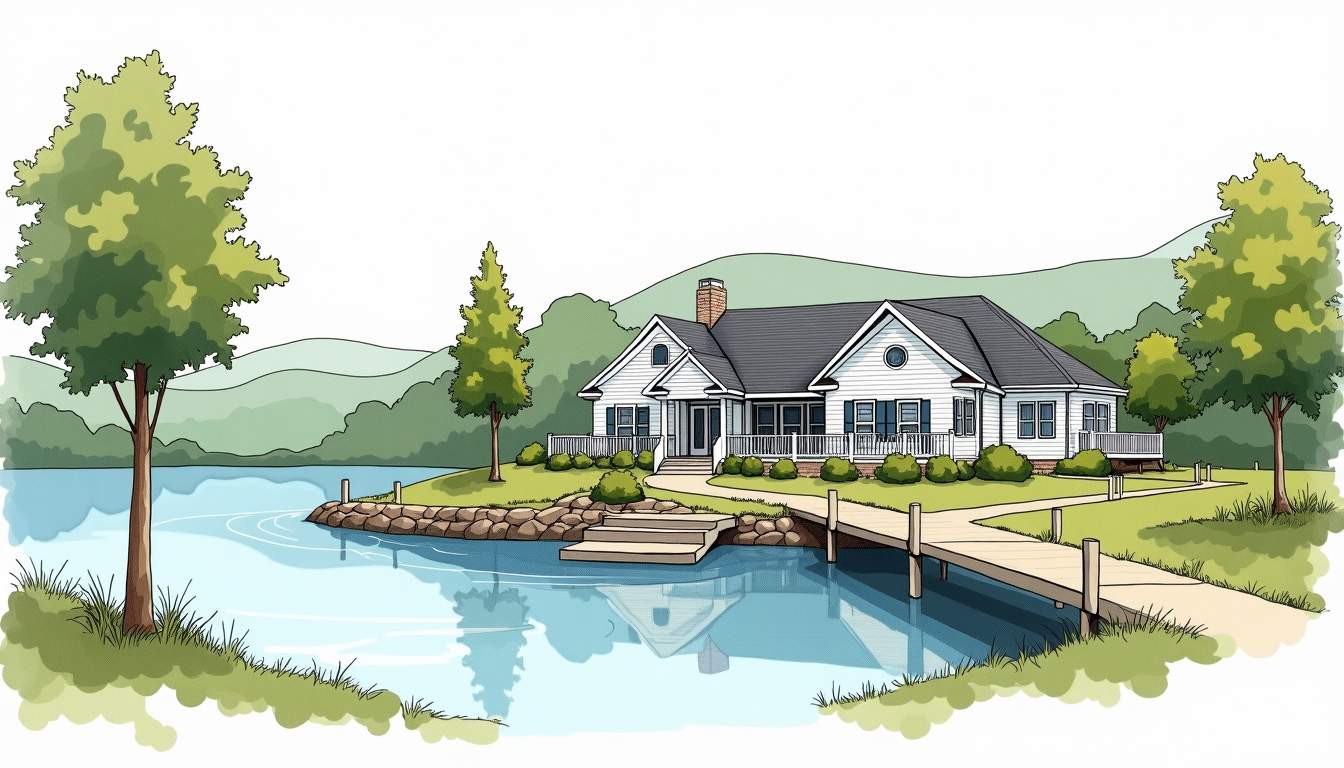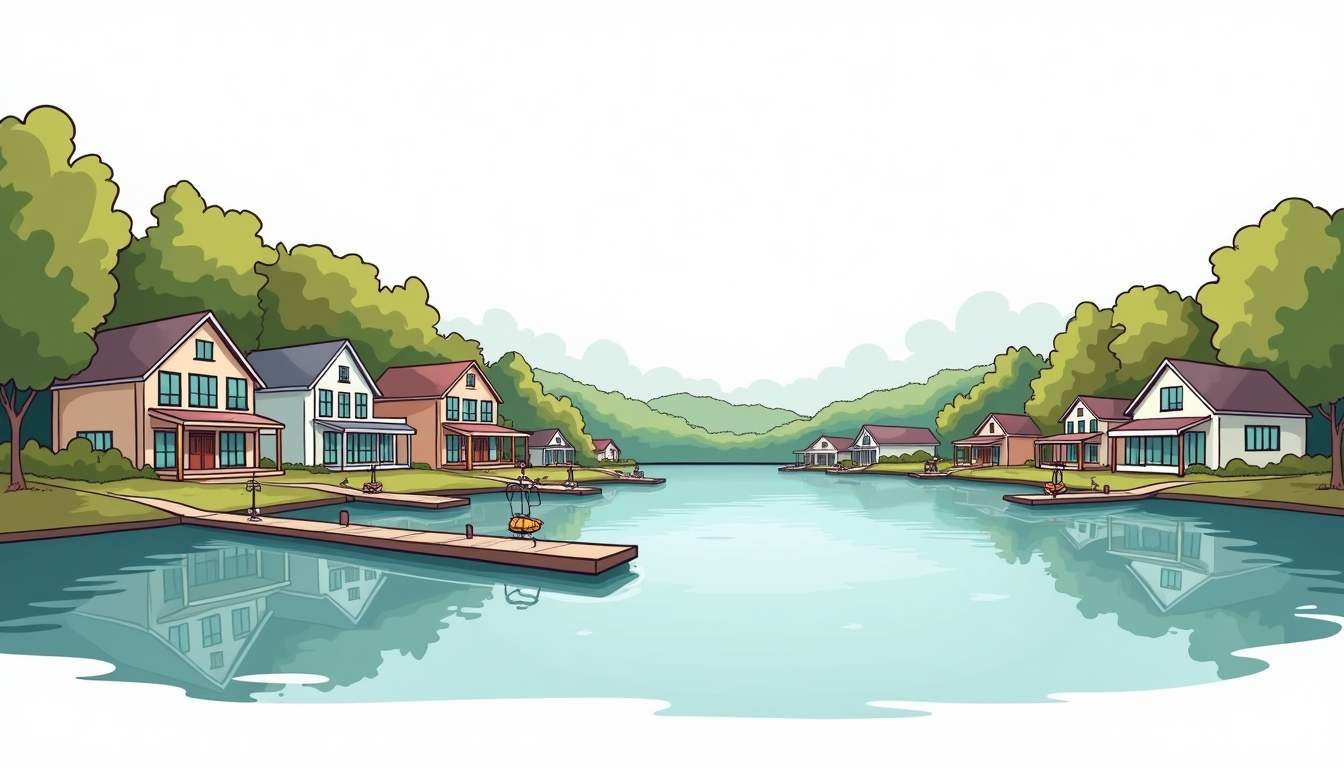
Exploring lakeview properties in East Tennessee reveals a unique blend of scenic beauty, recreational opportunity, and long-term investment potential. This guide walks through the practical considerations, neighborhood choices, financing options, inspection priorities, and lifestyle decisions that matter most when buying a lakeview home in this region.
East Tennessee combines rolling hills, clear water, and relatively accessible urban centers like Knoxville and Chattanooga. Lakes such as Norris, Douglas, Cherokee, and the many reservoirs along the Tennessee River create varied waterfront experiences—some intimate and quiet, others more developed with marinas and community amenities.
Beyond scenery, lakeview homes offer recreational access to boating, fishing, swimming, and hiking, often within a short drive of major employers and cultural attractions. For buyers seeking a second home or a retirement move, the region's lower property taxes and overall cost of living can be attractive compared to many lakeside markets elsewhere in the U.S.
The local culture also enhances the appeal of lakeview properties in East Tennessee. Communities around these lakes often host seasonal festivals, farmers' markets, and artisan fairs that celebrate regional heritage and craftsmanship. Residents enjoy easy access to dining that features fresh, locally sourced ingredients and southern-style hospitality, creating a rich and welcoming lifestyle. Additionally, the area’s moderate climate allows for year-round enjoyment of outdoor activities, making lakefront living ideal throughout all seasons.
Infrastructure improvements over recent years have also increased connectivity without sacrificing the tranquil feel of the area. High-speed internet options and upgraded roadways mean that remote work or commuting to nearby cities is more feasible than ever for lakefront homeowners. This balance of peaceful natural settings with modern conveniences continues to draw families, retirees, and investment buyers looking for properties that blend lifestyle with practicality.
Each lake and community near it has distinct characteristics: water levels, shoreline development, community rules, and nearby services differ. Narrow down choices by prioritizing what matters—privacy, easy boating access, walkability to local shops, or proximity to healthcare and schools.
Many East Tennessee lakes are TVA-managed reservoirs, meaning water levels fluctuate seasonally. This affects docking, swimming areas, and shoreline appearance. Natural lakes may have more stable shorelines but are less common here. Check historical water-level data and speak with locals to understand how the shoreline behaves year-round.
Gated communities and HOA-managed developments often provide maintained beaches, private boat launches, and community docks. These amenities can improve lifestyle and property values but usually come with HOA fees and rules about dock construction, boat types, and rentals. Conversely, rural lakeside parcels may offer freedom from restrictions but require more DIY maintenance and septic or well systems.
Proximity to highways, grocery stores, hospitals, and airports matters both for full-time residents and weekenders. Some prime lakeview properties are remote—fantastic for solitude but less ideal for daily commuting. Factor in drive times during different seasons and the quality of local roads, which can vary widely.
Lakeview properties can command premiums for views, water access, or private docks. Financing a waterfront home often requires careful budgeting for both upfront costs and ongoing maintenance—insurance, dock repairs, erosion control, and higher property taxes in some counties.
Conventional mortgages, VA loans, and USDA programs may be available depending on the property's location and buyer qualifications. Lenders will assess flood risk, insurance availability, and whether the home is on a permanent foundation. Appraisals can be tricky for unique lakefront properties; working with lenders experienced in waterfront valuations reduces surprises.
Flood insurance may be required if the property lies in a FEMA-designated floodplain; even if not required, purchasing flood coverage is often wise for waterfront homes. Insurance rates depend on elevation, flood zone, and history of claims. Shop multiple insurers and consider policies that cover both structural and personal-property losses tied to water events.
Typical additional expenses for lake properties include dock permits, shoreline stabilization, higher utility costs for maintaining systems in humid/seasonal climates, and potentially higher pest-control needs. Factor in periodic dredging or vegetation management if the property includes shallow coves prone to weed buildup.
Standard home inspections remain essential but require lake-specific attention. Water-related risks, unique septic and well systems, and dock conditions must be evaluated to avoid costly surprises after purchase.

Many lake homes, especially those outside municipal service areas, rely on septic systems and wells. Inspectors should check tank condition, drainfield performance, and well pump health. Understanding the age and maintenance history of these systems helps determine near-term replacement risks and costs.
Examine shoreline integrity—signs of erosion, retaining walls, and vegetation that stabilizes banks. Docks and boathouses often need repair or replacement; confirm permit status and whether structures are compliant with local regulations. Also, verify who is responsible for shared shoreline maintenance if adjacent properties share riparian features.
Lake houses face unique moisture challenges: higher humidity, condensation in crawlspaces, and mold in less-ventilated areas. Inspections should include a thorough moisture check, attic and crawlspace ventilation assessment, and evaluation for wood rot or pest damage exacerbated by damp conditions.
Buying a lakeview home can attract multiple offers because scenic properties are in high demand. Smart negotiation balances an attractive offer with protection for the buyer through contingencies and proper timing.
Common contingencies—inspection, financing, and appraisal—provide essential protections. Given the specialized nature of lake properties, consider adding contingencies for septic/well inspections, shoreline surveys, and dock permitting. These allow backing out or renegotiating if high-cost issues emerge.
Understanding seller priorities helps craft offers that stand out. A seller looking for a quick close might accept a slightly lower price with expedited timelines, while another may prioritize offers without heavy contingencies. Local agents often glean seller motivation and can suggest terms that appeal beyond price, such as flexible occupancy dates or earnest-money deposits.
Not all "lakeview" properties are equal. Views that are protected by conservation easements or community covenants hold value better than views that could be obstructed by future development. Similarly, deeded lake access or private dock rights materially affect long-term enjoyment and resale value, so include those factors in offer price calculations.
Waterfront property involves specific legalities: riparian rights, easements, and permitting requirements for docks or shoreline modifications. These issues can influence use rights and future improvements.

Riparian rights govern shoreline use and can vary by property. Some lakefront parcels grant full access to the water and allow private docks; others may have shared access or restrictions. Confirm the exact rights recorded in the deed and any recorded easements that affect access or development.
Dock construction, shoreline stabilization, and boathouses typically require local and sometimes state or federal permits. Consult county planning departments early to understand permit timelines, environmental protections, and restrictions tied to TVA-managed reservoirs or other regulated waters.
Seasonal changes affect both living conditions and market dynamics. Consider how year-round versus seasonal use aligns with personal plans and future resale goals.

Winterizing docks and water systems, managing leaves and debris in autumn, and preparing for high-season maintenance are part of lake property ownership. Seasonal access roads may require four-wheel-drive vehicles at times. Plan for a maintenance schedule and budgeting for seasonal contractors who understand waterfront needs.
Properties with maintained docks, clear legal access, and well-documented maintenance histories generally resell more quickly. Consider market trends in the specific lake community: some areas attract consistent buyer interest due to strong community amenities and limited inventory, while others are sensitive to local economic shifts or public access changes.
Local real estate agents, inspectors, lenders, and attorneys who specialize in East Tennessee lake properties provide expertise that out-of-area professionals may lack. Their familiarity with local zoning, typical inspection issues, and market expectations can save time and money.
Select an agent with a proven track record in lakefront transactions and the ability to coordinate specialized inspections. Likewise, hire inspectors who have specific experience with docks, septic/well systems, and shoreline conditions. Recommendations from neighbors, marina operators, and local contractors often identify reliable professionals.
A land survey clarifies boundaries and easement locations—especially important on irregular shorelines where historical changes or informal use may have created disputes. Legal review of deed language and riparian rights prevents unpleasant surprises after closing, such as disputes over dock placement or shared access ways.
Before the closing date, confirm a few practical items that make ownership transition smoother and protect the investment.
Verify that utilities are active or can be activated, permits for existing docks and structures are in order, and access roads are recorded and passable. Ensure insurance policies are in place and that title insurance reflects all easements and rights.
A final visit to observe water levels, neighborhood activity, and noise at varying times of day helps avoid surprises. Early morning and evening checks can reveal how wind and community activity affect the view, privacy, and on-water traffic.
Lakeview living in East Tennessee offers a blend of outdoor recreation, scenic tranquility, and community connection. With careful due diligence—paying attention to shoreline behavior, legal rights, and specialized systems—buyers can find properties that deliver enjoyment and long-term value.
Whether seeking a year-round residence, a seasonal retreat, or an investment property, the key to success is combining local expertise with a clear set of priorities. That approach helps ensure the perfect balance of view, access, and practicality for life on the lake.
Ready to embrace lakeview living in East Tennessee? Tennessee National offers the perfect blend of luxury and natural beauty within a premier gated community. Enjoy exclusive access to a Greg Norman Signature Golf Course, private marina, waterfront dining, and over 20 member amenities designed for a vibrant lifestyle. Whether seeking a move-in ready home or a custom build, explore the exceptional options awaiting you. Schedule a Private Tour today and start living the lakefront dream at Tennessee National.